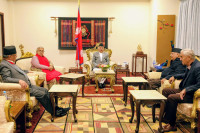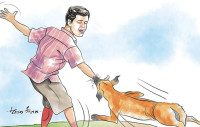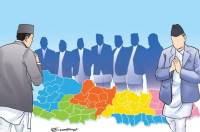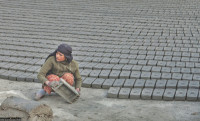Opinion
October octaves
The day Deuba was ousted by the king marked a dark point in our quest for democracy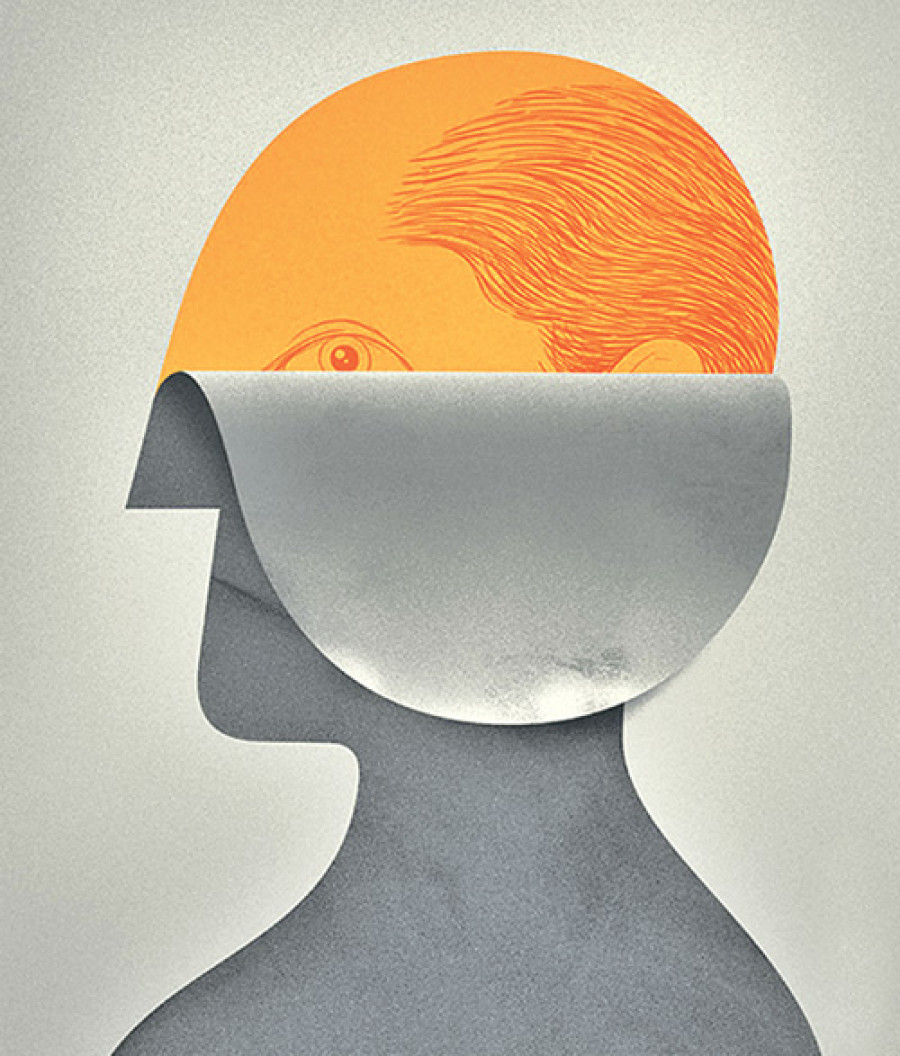
Gopal Man Shrestha
When Nepali Congress President Sher Bahadur Deuba recalled the times faced during former king Gyanendra Shah’s direct rule in the context of the ongoing saga of the CIAA chief in our central committee meeting on Thursday, it gave me a slightly uneasy feeling. Deuba was ousted following a coup d’état by Gyanendra 14 years ago in October 2002, the second time that an elected prime minister was discharged of duties by the king. (BP Koirala was the first to face the axe from king Mahendra in 1960.) It was a dark day in the quest for democracy in the country.
The royal takeover
In 2001, when Deuba was the prime minister, the then Maoist rebels had launched massive violent attacks in Syangja and Dang. Deuba had no option but to impose an emergency to keep the Maoists in size. The Army was heavily mobilised. But things took a turn when the emergency had to be extended after its six-month period ended. The then NC president Girija Prasad Koirala, who first gave Deuba the go-ahead for an extension, suddenly retracted his words and urged Deuba to reconsider his announcement to extend the emergency. Deuba and Koirala both stuck to their stances leaving their feud so bitter to the point that Koirala ousted Deuba from the party. Deuba was left with no choice but to form the Nepali Congress Democratic.
The Palace capitalised on this separation, emerging more powerful and autocratic. Parliament was dissolved in May 2002 with one eye on parliamentary polls. But following suggestions of other major political parties that elections were not possible at a time when the Maoist insurgency was at its peak, the Palace gave Deuba the green light to reconsider holding polls. At that time, I had suggested Deuba to reinstate Parliament, as a practical solution—for anything is possible in politics—but we could not garner enough support from other political forces and polls were postponed accordingly.
Despite paying heed to suggestions from all quarters, Deuba for no apparent reason was abruptly labeled “incompetent to hold polls” and relieved of his post. As the Palace then began dangling the prime ministerial post to Surya Bahadur Thapa and Lokendra Bahadur Chand, our movement for Deuba’s reinstatement gathered pace.
Succumbing to our pressure, Gyanendra decided to reinstate Deuba and he soon formed another government with the help of the CPN-UML. Madhav Nepal, the then UML general secretary, acknowledged that “the king had corrected half the mistake”, and Deuba felt he was given justice. However, within eight months of taking charge, Deuba was once again dismissed.
Gyanendra took charge of the government himself, just like Mahendra imposed a direct rule in 1960. Political activities were curtailed, all the means of communication—radio, television, phones—were controlled, flights were canceled and Kathmandu’s airport was sealed.
At that moment, I was about to catch a flight to Pokhara but was soon suggested to head back home following the takeover. Senior leaders were put under house arrest and I was told not to leave Kathmandu.
Challenging the takeover
Then came the dreaded Royal Commission, which was very powerful. It was formed with the intention to file a corruption case against Deuba as the prime minister and Prakash Man Singh as the minister for physical planning for “irregularities in the Melamchi project.” Everything was pre-planned. Just a couple of months before, there had been violence in the Capital to “protest” the brutal murder of Nepalis in Iraq. How could we not sniff the Palace’s move of a takeover?
This was when I was given the post of acting president of the NC Democratic, for Deuba saw me as the most able candidate. Deuba, jailed in Maharajgunj and Singh in Tripureshwor, were asked to furnish clarifications on the charges. Had they done so, the Palace was planning to jail both Girija Prasad and Madhav Kumar on the same charges. Gyanendra had looked to run his rule for long, but Deuba and Singh refused to speak.
In the streets, we tried everything—from symbolic protests of holding parliamentary sessions to gathering massive numbers of people to foil the takeover. I was leading the NC Democratic’s movement while Girija Prasad, as the NC’s president, initiated a five-party alliance that included the UML. Times were extremely difficult. As the acting party president, I had regular meetings with Deuba in jail in the mornings. But even with us joining hands with Girija Prasad to launch a joint movement against the royal regime, our quest could not be quite as decisive. Leaders and cadres were constantly arrested, gatherings were strictly prohibited and all movements were monitored.
Eventually, we aligned with the Maoists in our pursuit. Decisive talks were held at the behest of Girija Prasad and Madhav Kumar in Delhi. I had earlier visited the then Maoist leader Baburam Bhattarai to talk about the matter. We were also in regular contact with our well-wishers in the neighbouring countries and the West. Then came the 12-point understanding in November 2005 between the seven-party alliance and the Maoists—in which, among other things, we agreed to fight the autocratic regime. I, as the acting president of the NC Democratic, asked for permission to pay a visit to Deuba in jail to share with him the deal’s details. Madhav Kumar accompanied me and Krishna Prasad Situala brought in the documents. Deuba, after considering everything, gave me the nod and I ended up as one of the signatories of the historic pact.
Our movement became unstoppable—civilians poured in from everywhere. Those who earlier feared to come out because of the Maoist violence also participated. The Kathmandu Valley, major cities and villages were visibly in the mood for a serious revolt. The Palace could not face our determination for justice and freedom, leading to the release of Deuba in February 2006. We did not stop there. In April that year, Gyanendra was forced to give up power after sweeping anti-monarchy protests across the country. The rest is history.
Shrestha is a senior leader of the Nepali Congress




 14.12°C Kathmandu
14.12°C Kathmandu
